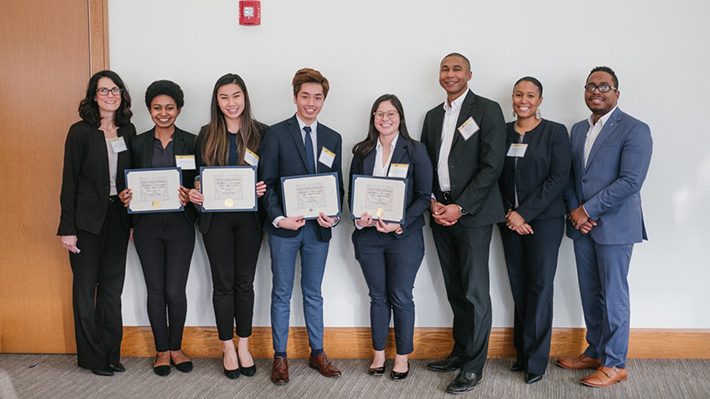Working in Healthcare? Rutgers Dishes New Advice – New York News

Let’s explore some of the most interesting stories that have emerged from New York business schools this week.
Working In Healthcare? Here’s How to Stay Relevant – Rutgers Business School News
The Rutgers Business School recently shared five reasons its Masters in Healthcare Services Management is the “answer for professionals … who want to up their game with analytic skills, leadership development and business knowledge.”
- Analytical skills are a necessity: “Data provides critical insights needed to inform better decision-making and improve operational efficiencies.”
- It’s all about delivering value: Stay “up-to-date about changes in health care and…value-based practices that ensure quality services.”
- Empowered to bring about change: “Students learn what it takes to change practices, make operational improvements, and be effective leaders.”
- It’s not as hard as you think: “Many courses can be taken online to supplement time in the classroom. And students are able to waive up to six credits for eligible work experience.”
- Hands-on learning: “Students in the program are required to complete a capstone project that gives them a chance to work with a real healthcare provider on an actual problem.”
You can read more from the recent RBS article here.
Answering the Call for AT&T: Interns’ Insights Add Value at Company’s Indian Operations – Stevens Institute of Technology School of Business News
The Stevens Institute of Technology SOB blog recently highlighted some positive accolades from AT&T Business’s senior VP of Service Excellence Paul Rosenbaum, specifically regarding the company’s longstanding history with Stevens.
Rosenbaum expressed his pleasure with the Business Intelligence & Analytics students who interned at the company’s office in Hyderabad, India this past summer. “We know the quality of the students, and many of our executives are Stevens alumni. My team in India and my team in the U.S. were really impressed with these students’ capabilities,” he says.
He explains that because “Stevens business students are bilingual in business and analytics [they are] well suited to leading technical teams.”

Five Stevens School of Business interns, alongside several colleagues and AT&T employees, from the company’s Hyderabad office / Photo via stevens.edu
Of the experience in Hyderabad, Sanjay Pattanayak, ’18, writes, “This is the first place I’ve worked where equal opportunity is given to individuals to bring ideas to the table or suggest solutions, rather than just top-down leadership.”
“Having that independence, and being encouraged to put your ideas into action, enables the development of you as an individual and strengthens the organization.”
You can read more about the school’s program and Rosenbaum’s observations here.
Lehigh Announces New Philly Focus for Flex MBA – MetroMBA
Next Spring, Lehigh’s Flex MBA program will unveil two non-degree courses developed by the MBA Test Drive Program for prospective students at the school’s Center City Philadelphia location (1800 JFK Blvd).
“From Plan to Action: Strategy and Organization” will investigate “business model development in today’s competitive environment as well as the use of disruptive innovation in strategy development” while “From Private to Public Company: A Path to Exit” will survey the “considerations involved” in taking a company public.
You can learn more about the new Lehigh Flex MBA course offerings here.
The Muddled World of Leadership Cliches, and More – Philadelphia News

As November draws to a close, let’s take a look at some of the biggest business school stories coming out of Philadelphia business schools this week.
Three Big Leadership Clichés – and How to Rethink Them – LinkedIn
Geoffrey Garrett, Dean of The Wharton School and official LinkedIn “Influencer,” recently took to the social media site to talk about the gamut of leadership cliches that dominate the conversation around those roles.
In a conversation with a group of upper-level executives at the Wharton CEO Academy in New York, Garrett pivoted away from the following three cliches, turning them into something more modern, useful, and promising:
1.) Stick to your guns
2.) Question everything
3.) It’s a marathon, not a sprint
On sticking to one’s guns, Garrett emphasizes certain elements of 1980s corporate and political culture that found esteeming value when a leader does not waver on their principles. “Sticking to your guns is valued because it signals strength, courage and commitment under adversity, which is why we so often think about war heroes in this way,” he says.
He notes, however, that there is value in knowing when to “fold ’em” with a key Kenny Rogers reference in tow. “There is no simple score sheet to tell you when the positives from sticking to your guns become outweighed by the negatives. But the world is littered with examples where leaders wait too long to make the switch. Think General Lee’s historic defeat at Gettysburg in the American Civil War, Jeff Immelt at GE or John Chambers at Cisco,” Garrett continues.
“Most leaders will change course eventually because there is not much valor in heroic defeats. But the best leaders will change course long before the writing is on the wall. Compare the demise of Kodak with the transformation of IBM. But how do you know when the writing is on the wall? The answer is judgment, arguably the most valuable trait in a leader. It’s easy to recognize in hindsight, because good leaders make good decisions—the definition of good judgment.”
To see the rest of Garrett’s advice on leadership cliches, head over to LinkedIn.
Drexel Students Win Second Annual Diversity Case Competition – Drexel LeBow News
Students from the Drexel University LeBow College of Business brought home a brand new title as winners of the second annual Diversity and Inclusion Business Case Competition.
Drexel LeBow defeated 11 other local challenging universities in a competition with a goal to “help create a diversity training protocol for Home Away From Home, a global hotel chain,” according to the business school.

Winners from the LeBow College of Business at the second annual Diversity and Inclusion Business Case Competition / Photo via lebow.drexel.edu
The LeBow team of “Johnny Zhu, Kimberly Gain, Stephanie Arredondo, and Rachael Wright” nabbed first place with their curiously-titled “Raising Our One Family (ROOF)” strategy. Zhu explains, “ROOF stands for the overall company-wide training, which is rolled out in the form of top-down management and tailored to individual locations, corporate level, and field level. This proposal is not a mold, but a 360-integrated training approach where as a family, employees are living out the mindset of diversity and inclusion, not only to guests but to each other as well.”
To learn more about the Drexel LeBow team and the case competition, click here.
The Bizarre Bias That Affects How You Shop – BBC
The work of Beth Vallen, a researcher at the Villanova School of Business, was recently highlighted by author Martha Henriques in the BBC regarding just how pervasive “anti-fat” bias can be.
Henriques notes that overweight people tend to statistically suffer when it comes to things like job offerings, and even get less eye-contact than people of average weight and size. It is perhaps not so surprising to find that business models are often altered for overweight people.
In “Shape and Trait‐Congruency: Using Appearance‐based Cues as a Basis for Product Recommendations,” a new study authored by Vallen and colleagues Karthik Sridhar, Dan Rubin, Veronika Ilyuk, Lauren G. Block, and Jennifer J. Argo—published in the Journal of Consumer Psychology—found that overweight customers were offered more products that resembled their body types, even if the products, such as bottles of perfume, were not wearable.
Speaking with Henriques, Vallen says, “Our thinking was these subtle prejudices that lead to these effects are based on something more than superficial shape-matching.”
“We wanted to show that this was a bias that reflects the thoughts and decisions processes of all people, not just sales people.”
To read more about the study, head over to the BBC website and the Journal of Consumer Psychology.
